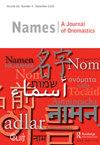Spanish Place Names of the Falkland Islands
IF 0.6
3区 文学
0 LANGUAGE & LINGUISTICS
引用次数: 3
Abstract
It has been argued that no Spanish toponymic inventory is used in the Falkland Islands (Woodman 2016). Nonetheless, maps attest to the presence of several Spanish names. The existence of these place names reflects the history of the area. Even though the Falklands currently host an English-speaking community, the Islands have a long history of Spanish-speaking settlers. The former Spanish administration as well as contact with 19th century Spanish-speaking gauchos left quite a few Hispanic toponyms. Mostly coined after 1833, these toponyms collectively reflect the need for orientation, delimitation, and land management for livestock. However, there is another group of Spanish place names that is not used in the Islands. These toponyms are partly a result of the ongoing Argentinian claim of sovereignty over the Falklands. The objective of this paper is twofold: to account for the existence of Spanish place names used locally to refer to the Islands, and to present a novel classification system for the Spanish-language toponymic inventories of the Falklands into Gaucho-heritage and Argentinian. For these purposes, both traditional and modern approaches of toponomastic analyses were employed.福克兰群岛的西班牙语地名
有人认为,福克兰群岛没有使用西班牙地名清单(Woodman 2016)。尽管如此,地图证明了几个西班牙名字的存在。这些地名的存在反映了该地区的历史。尽管福克兰群岛目前有一个讲英语的社区,但该岛长期以来一直有讲西班牙语的定居者。前西班牙政府以及与19世纪讲西班牙语的高乔人的接触留下了相当多的西班牙语地名。这些地名大多是在1833年以后创造的,它们共同反映了对家畜定位、划界和土地管理的需要。然而,还有一组西班牙地名不在群岛上使用。这些地名的部分原因是阿根廷对福克兰群岛的主权要求。本文的目的有两个:一是解释当地使用的西班牙地名的存在,二是提出一种新的分类系统,将福克兰群岛的西班牙语地名清单分为高乔遗产和阿根廷遗产。为了这些目的,采用了传统和现代的拓扑分析方法。
本文章由计算机程序翻译,如有差异,请以英文原文为准。
求助全文
约1分钟内获得全文
求助全文
来源期刊

Names-A Journal of Onomastics
Multiple-
CiteScore
1.30
自引率
50.00%
发文量
23
期刊介绍:
Names, the journal of the American Name Society, is one of the world"s leading journals in the study of onomastics. Since the first issue in 1952, this quarterly journal has published hundreds of articles, reviews, and notes, seeking to find out what really is in a name, and to investigate cultural insights, settlement history, and linguistic characteristics revealed in names. Individuals subscribing to Names automatically become members of the American Name Society and receive the journal as part of their membership.
 求助内容:
求助内容: 应助结果提醒方式:
应助结果提醒方式:


